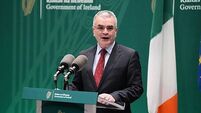Concern over how tariffs could impact Irish film industry

Vivienne Clarke
The co-CEO of Element Films, Ed Guiney, has expressed concern and confusion over US President Donald Trump’s comments about imposing a 100 per cent tariff on films not made in the USA.
“Honestly, we're all scratching our heads. I mean, it was very disconcerting to wake up to that bombshell yesterday morning. And actually, I suppose since then, as with, as is often the case with Trump, things have moderated and changed. And now the White House are making more, I won't say positive, but they're kind of qualifying the statement, I suppose,” he told RTÉ radio’s Morning Ireland.
“But it's really hard to understand how a tariff would be imposed because so much of the activity that happens in the world is actually owned by American studios. These things are services, they're not products in the way that you know you traditionally imagine tariffs being imposed on a product.
“So there is an awful lot of head-scratching. I think behind it, there is definitely an anxiety in the States in that there is a lot of what they call runaway production. In other words, American film and television production that shoots all around the world. And actually, we benefit from it hugely here in Ireland.
“As is well known, we have an amazing crew base here and we've very decent incentives and a very buoyant industry. And same with the UK and Canada. But I think there is a feeling that a lot of American stuff should be shooting in the US, but actually that's largely down to the cost base in the States, which is very high, and also the incentives. And there are incentives in some of the states of America.
"So I think the other thing that's emerging in this is a conversation around whether there should be a federal tax incentive in America to keep American production at home.”
Mr Guiney said that if such a tariff was imposed it would be “very, very damaging” for the Irish film industry.
There was also an issue of how such a tariff could be gauged and how it could be implemented when many productions were internationally funded.
The uncertainty over the issue would not be good for business, he said. “The uncertainty that this engenders is not good for business, it really isn't. And that's coming on the back of Covid.
"The SAG strike, the fires in L.A., you know, kind of a tough old time for the industry. So it just isn't helpful.”
Panic
Award-winning producer David Puttnam has warned that the “worst thing” anyone in the film industry can do is panic about US President Donald Trump’s warning about a 100 per cent tariff on non-US films.
“I think the problem is we're giving an extraordinary amount of credibility to an entirely ignorant tweet,” he told RTÉ radio’s Today with Claire Byrne show.
Mr Puttnam said that in “four out of five, five out of six of the major policy statements he's made, he's retreated from.”
The biggest issue was the uncertainty caused by President Trump’s comments. “At the moment of uncertainty, the worst thing anyone can do is panic. And I'd like to think that the people I know, certainly at Screen Island for example, are very smart people, that they don't panic, that they rethink, reorientate, and remember the most important thing, that America makes a huge amount of money out of the industry the way it is right now.”
Mr Puttnam described the President’s threat as “incredibly ignorant because it's a very, very, very complicated business.
“You've got to remember that, first of all, only 28 per cent of revenues are generated back in America. So it's 72 per cent of all the money that movies make is made outside the United States. But that's the first, I think, probably most important thing.
“Secondly, the way the film ecosystem works is immensely complex. So for example, a lot of the revenues you get are from streaming, from any kind of means of distribution, how you track those, how you decide, do they qualify as this, do you qualify as that, is almost impossible.
“In 1988, I was one of two negotiators for the EU when we went through all this before with Clinton. And in the end, Clinton made all sorts of promises to the Americans, but we ended up with the status quo. And I suspect we wouldn't end up a million miles away from that this time. But what it will do is generate incredible insecurity in terms of people's investment plans”
Mr Puttnam pointed out that there was a reason why some tv series were made outside the US because audiences wanted to see such locations.
“I'm not pretending anything simple about this. What I would say is in the end, filmmaking's about stories. And for us in Ireland, it's about our own stories. We happen to be very good storytellers.
"It will be about economics to a degree. But I'm going to be advising my own students, young film students that this is an opportunity more than a threat. And it's an opportunity to start telling their own stories at an economically viable price and to audiences who hopefully will reward them because they're interested in their own stories.”
The tragedy was that President Trump was getting advice from people like Mel Gibson, Jon Voight, Sylvester Stallone. It was a very sophisticated business with good systems already in place for evaluating the nationality of a film, he added.
“This is a stupid move. It will undoubtedly, I think, blow up in his face, pretty well everything blows up in his face, but he's gonna cause far more chaos than he'll solve.
"He'll bring a few jobs back to the United States, but I promise you, every American involved in making and distributing movies today is very, very worried. They're not sitting there thinking, oh great, this is a bonanza for America. It ain't.
“We may start to have to go back to making films for relatively inexpensive sums of money but that's a creative challenge and it's also a creative opportunity. You'll be interviewing people two or three, four years from now who have made very good films as a direct result of Donald Trump's plundering.”
Uncertainty about investment could impact confidence and mean that people will “look at their spreadsheets” and cause them to relook at how they do things.
“But the key message here, because I really want to be encouraging, is from a creative point of view, this could emerge as maybe a very, very good thing. It will have to be, it'll be a reshaped industry, it'll make us look at what we're good at, and also look at the inflated costs of movies which have become increasingly unjustified.”






